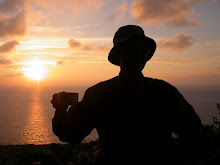#2021-0722
I woke up from a dream. What a real dream! And what time was it? It was 5:20 in the morning, a time when I should be sleeping soundly.
I was anxious about forgetting the dream; such a special dream, I felt I had to write it down...
[I am a man who can remember a dream when waking from it; the details of the dream, everything happening in it, being so vivid that I can describe well after I just wake up from it. My wife says that I am lucky to be such a man. She says she forgets her dream (her real dream) easily; just knowing she has had a dream, she cannot describe it as clearly as I do.]
But then I was anxious about forgetting the dream; I had to jot it down before it became hazy, or completely gone -- lost!
It was a familiar setting for me. A few rice paddies where I had passed by, one after another. When I was walking by the fields, I had a chutou (?) in my hands -- yes, hands in plural, because it was a farm tool heavy enough for me to "hold" in both of my hands.
"Son," my father once said to me, "I hope you'll hold a small pen when you've grown up."
He meant a pen so light and small that one can hold it well in just a hand.
"Don't be like me," he said. "I hadn't had a chance to go to school, so I must hold a big, heavy pen to earn a living!"
My father, who passed away several years ago, had worked on the farm all his life -- either on the mountainside or in the rice field. You may call such a person "farmer" but in my case another English word ("peasant") might be better used to describe my dad, as he used to be a poor peasant.
Oh, in the dream I had last night (or this morning), I didn't care about whether I was son of a poor peasant. I forgot what I had been doing most of the time in my life. I even totally forgot that I was in my later sixties already. In my dream I was still a teenager.
I passed by the ladder-like rice paddies, with a farm tool called chutou in my hands. I was helping my father; I went around our small paddies to check whether or not they had enough water in them. Then I returned home, and saw my father walking out of our old house -- a shabby cottage or lodge, a simple dwelling typical in the remote countryside.
"Dad, going out working?" I greeted my father.
"Oh, you're back home! Good, good," he said.
He told me there was something to eat on the kitchen table. And he noticed that I had a farm tool in my hands. So he asked, "Where did you go? -- Why not put down the chutou (hoe) and have something for breakfast?"
I was happy to hear that. And, in the bottom of my heart, I was a little proud of myself because I took the initiative to help work on the farm -- I just checked and saw that there was plenty of water in our paddies. We were able to grow rice as usual, or as before, because we had enough water in this season.
Yes, it's important to have sunshine, and fresh air, and water.
In the real world we all need these kinds of things to live on. In the real world, in fact, we've been suffering the COVID-19 pandemic. We need a good dream, and we need many more, don't we?
By the way, I can not only remember a dream that is interesting to me, but I can also realize why I've had the dream. Take this new dream (of my passing by the rice paddies with a hoe in my hands) for example: I have found out why I had such a dream.
Yesterday afternoon my wife and I took a walk on the nearby hillside; we stood up there for a while, seeing the water in the new fields far away from us -- the water in the paddies reflecting the strong sunshine, which made those distant paddies so brightly white, just like a landscape water painting with many small snow-white parts in it.




















